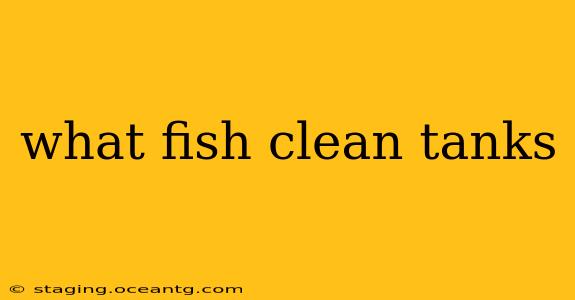What Fish Clean Tanks? A Guide to Choosing the Right Tank Cleaners
Keeping a clean aquarium is crucial for the health and happiness of your fish. While regular maintenance is a must, certain fish species can significantly contribute to a cleaner tank environment. These fish, often called "clean-up crews," help control algae, uneaten food, and other debris. But choosing the right fish requires careful consideration of your tank size, existing inhabitants, and water parameters. Let's dive in and explore some popular choices.
What types of fish are good at cleaning tanks?
Many fish species contribute to tank cleanliness, but their effectiveness varies. Some are better at controlling algae, while others are adept at consuming leftover food and detritus. Popular choices include:
-
Otocinclus Catfish (Oto): These small, peaceful catfish are algae-eating specialists. They are excellent at removing algae from surfaces like glass, plants, and decorations. However, they require a well-established tank with adequate algae growth to thrive. They are not effective at cleaning up detritus or uneaten food.
-
Siamese Algae Eaters (SAE): Another popular algae-eater, SAEs are more active and aggressive than Otos, making them suitable for larger tanks with heavier algae infestations. However, they can become picky eaters as they mature, sometimes refusing algae and potentially harming other fish if hungry.
-
Nerite Snails: These snails are tireless algae grazers and are extremely efficient at cleaning glass and other surfaces. They are relatively low-maintenance and are a good choice for beginner aquarists. However, they do not consume detritus.
-
Amano Shrimp: Amano shrimp are peaceful and efficient algae eaters. They're ideal for planted tanks as they won't harm your plants. Like other algae eaters, they rely on sufficient algae growth for sustenance.
-
Corydoras Catfish: These bottom-dwelling catfish are not strictly algae eaters, but they are excellent at scavenging leftover food and detritus from the substrate. This helps maintain a clean tank bottom and prevents the buildup of harmful waste.
-
Mystery Snails: Similar to Nerite snails, mystery snails are effective algae eaters. They're also good at breaking down decaying matter and can help with waste management. However, they reproduce prolifically, so you'll need to manage their population carefully.
What size tank do I need for clean-up crew fish?
The size of your tank dictates the number and types of clean-up crew fish you can comfortably keep. Overstocking can lead to stress and health problems for your fish, and it may not improve tank cleanliness. Research the specific requirements of each fish species before adding them to your tank. Larger tanks can support more fish, while smaller tanks require a more limited and carefully selected clean-up crew.
Will clean-up crew fish replace regular tank maintenance?
No. Even with a dedicated clean-up crew, regular tank maintenance is still essential. Clean-up crews are supplementary, not a replacement for water changes, gravel vacuuming, and filter maintenance. These fish help to control some aspects of cleanliness but cannot handle everything.
What if my clean-up crew fish aren't cleaning my tank?
Several factors could contribute to your clean-up crew's apparent inefficiency:
- Insufficient Algae/Food: If your tank lacks algae or uneaten food, your clean-up crew may not have enough to eat and won't be effective.
- Poor Water Quality: Poor water quality can stress and weaken your fish, reducing their cleaning activity. Regular water changes are crucial.
- Incompatible Tank Mates: Aggressive or territorial tank mates could be harassing your clean-up crew, preventing them from doing their job.
- Insufficient Hiding Places: Your clean-up crew might need more hiding places to feel secure and thrive.
By understanding the strengths and limitations of different clean-up crew fish and implementing appropriate tank maintenance, you can create a healthy and thriving aquarium ecosystem. Remember to research thoroughly before adding any fish to your tank to ensure compatibility and success.
